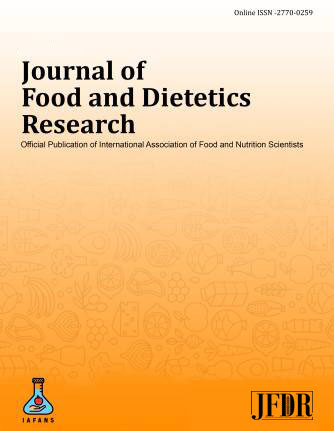Polycystic Ovarian Syndrome ( PCOS ) and Low Glycemic Diet - An Updated Review of literature
DOI:
https://doi.org/10.48165/jfdr.2023.3.1.1Keywords:
PCOS, polycystic ovary syndrome, nutrition, low Glycemic Index foodsAbstract
One of the most prevalent endocrine disorders, polycystic ovary syndrome (PCOS) is linked to an increased risk of metabolic dysregulation. Women who have PCOS have been found to have a higher incidence of obesity. Since eating disorders, such as binge eating, are frequently linked to obesity. Women with polycystic ovarian syndrome (PCOS) are intrinsically insulin resistant and have a high risk of cardiovascular disease and type 2 diabetes. Weight loss improves risk factors and hence low–glycemic index (low-GI) diets are recommended. The majority of PCOS women are lean, but they may still have central obesity and metabolic problems. In populations that are insulin-resistant, studies of dietary interventions with a low glycemic index (GI) have shown an increase in insulin sensitivity; However, in PCOS-positive women, there is little evidence of this effect. The objective of this review was to determine whether women with PCOS benefit from an isocaloric, low-GI dietary intervention on insulin sensitivity regardless of weight change. A GI diet may help restore menstrual regularity, reduce inflammatory markers and improve insulin sensitivity in women with PCOS.
Downloads
References
Hong, Y., Zhou, Z. H., Dong, Z., & Yang, D. Z. (2023). Prevalence of polycystic ovary syndrome under NIH criteria among the tenth-grade Chinese schoolgirls in Guangzhou area: a cross-sectional epidemiological survey. BMC Women’s Health, 23(1), 1-8.
Meczekalski, B., Niwczyk, O., Kostrzak, A., Maciejewska-Jeske, M., Bala, G., & Szeliga, A. (2023). PCOS in Adolescents—
Ongoing Riddles in Diagnosis and Treatment. Journal of Clinical Medicine, 12(3), 1221.
Sirmans, S. M., & Pate, K. A. (2013). Epidemiology, diagnosis, and management of polycystic ovary syndrome. Clinical epidemiology, 1-13.
Moran, L. J., Misso, M. L., Wild, R. A., & Norman, R. J. (2010). Impaired glucose tolerance, type 2 diabetes and metabolic syn drome in polycystic ovary syndrome: a systematic review and meta-analysis. Human reproduction update, 16(4), 347-363.
Zhou, Y. Effecs of Tanshinone on hyperandrogenism and quality of life in women with polycystic ovary syndrome: protocol of a double-blind, placebo-controlled, randomized trial.
Dumesic, D. A., Oberfield, S. E., Stener-Victorin, E., Marshall, J. C., Laven, J. S., & Legro, R. S. (2015). Scientific statement on the diagnostic criteria, epidemiology, pathophysiology, and molecular genetics of polycystic ovary syndrome. Endocrine reviews, 36(5), 487-525.
Lizneva, D., Suturina, L., Walker, W., Brakta, S., Gavrilova Jordan, L., & Azziz, R. (2016). Criteria, prevalence, and phenotypes of polycystic ovary syndrome. Fertility and ste rility, 106(1), 6-15.
Azziz, R. (2006). Diagnosis of polycystic ovarian syndrome: the Rotterdam criteria are premature. The Journal of Clinical Endocrinology & Metabolism, 91(3), 781-785.
Dunaif, A., & Fauser, B. C. (2013). Renaming PCOS—a two state solution. The Journal of Clinical Endocrinology & Metabolism, 98(11), 4325-4328.
Dokras, A. (2013). Cardiovascular disease risk in women with PCOS. Steroids, 78(8), 773-776.
Cesta, C. E., Månsson, M., Palm, C., Lichtenstein, P., Iliadou, A. N., & Landén, M. (2016). Polycystic ovary syndrome and psychiatric disorders: co-morbidity and heritability in a nationwide Swedish cohort. Psychoneuroendocrinology, 73, 196-203.
Fauser, B. C. J. M., Tarlatzis, B. C., Rebar, R. W., Legro, R. S., Balen, A. H., Lobo, R., ... & Barnhart, K. (2012). Consensus on women’s health aspects of polycystic ovary syndrome (PCOS).
Lim, S. S., Davies, M. J., Norman, R. J., & Moran, L. J. (2012). Overweight, obesity and central obesity in women with polycystic ovary syndrome: a systematic review and meta-analysis. Human reproduction update, 18(6), 618-637.
Barrea, L., Verde, L., Vetrani, C., Savastano, S., Colao, A., & Muscogiuri, G. (2022). Chronotype: a tool to screen eating habits in polycystic ovary syndrome?. Nutrients, 14(5), 955.
Barrea, L., Frias-Toral, E., Verde, L., Ceriani, F., Cucalón, G., Garcia-Velasquez, E., ... & Muscogiuri, G. (2021). PCOS and nutritional approaches: Differences between lean and obese phenotype. Metabolism Open, 12, 100123.
Lee, I., Cooney, L. G., Saini, S., Smith, M. E., Sammel, M. D., Allison, K. C., & Dokras, A. (2017). Increased risk of dis ordered eating in polycystic ovary syndrome. Fertility and sterility, 107(3), 796-802.
Jeanes, Y. M., Reeves, S., Gibson, E. L., Piggott, C., May, V. A., & Hart, K. H. (2017). Binge eating behaviours and food cravings in women with Polycystic Ovary Syndrome. Appetite, 109, 24-32.
Nafiye, Y., Sevtap, K., Muammer, D., Emre, O., Senol, K., & Leyla, M. (2010). The effect of serum and intrafollicular insulin resistance parameters and homocysteine levels of non obese, nonhyperandrogenemic polycystic ovary syndrome patients on in vitro fertilization outcome. Fertility and ste rility, 93(6), 1864-1869.
Basset-Sagarminaga, J., Roumans, K. H., Havekes, B., Mensink, R. P., Peters, H. P., Zock, P. L., ... & Schrauwen-Hinderling, V. B. (2023). Replacing Foods with a High-Glycemic Index and High in Saturated Fat by Alternatives with a Low Glycemic Index and Low Saturated Fat Reduces Hepatic Fat, Even in Isocaloric and Macronutrient Matched Conditions. Nutrients, 15(3), 735.
Marsh, K. A., Steinbeck, K. S., Atkinson, F. S., Petocz, P., & Brand-Miller, J. C. (2010). Effect of a low glycemic index compared with a conventional healthy diet on polycystic ovary syndrome. The American journal of clinical nutri
tion, 92(1), 83-92.
Mehrabani, H. H., Salehpour, S., Amiri, Z., Farahani, S. J., Meyer, B. J., & Tahbaz, F. (2012). Beneficial effects of a high-pro tein, low-glycemic-load hypocaloric diet in overweight and obese women with polycystic ovary syndrome: a random ized controlled intervention study. Journal of the American College of Nutrition, 31(2), 117-125.
Bargiota, A., & Diamanti-Kandarakis, E. (2012). The effects of old, new and emerging medicines on metabolic aberra tions in PCOS. Therapeutic advances in endocrinology and metabolism, 3(1), 27-47.
Mayer, S. B., Evans, W. S., & Nestler, J. E. (2015). Polycystic ovary syndrome and insulin: our understanding in the past, pres ent and future. Women’s Health, 11(2), 137-149.




